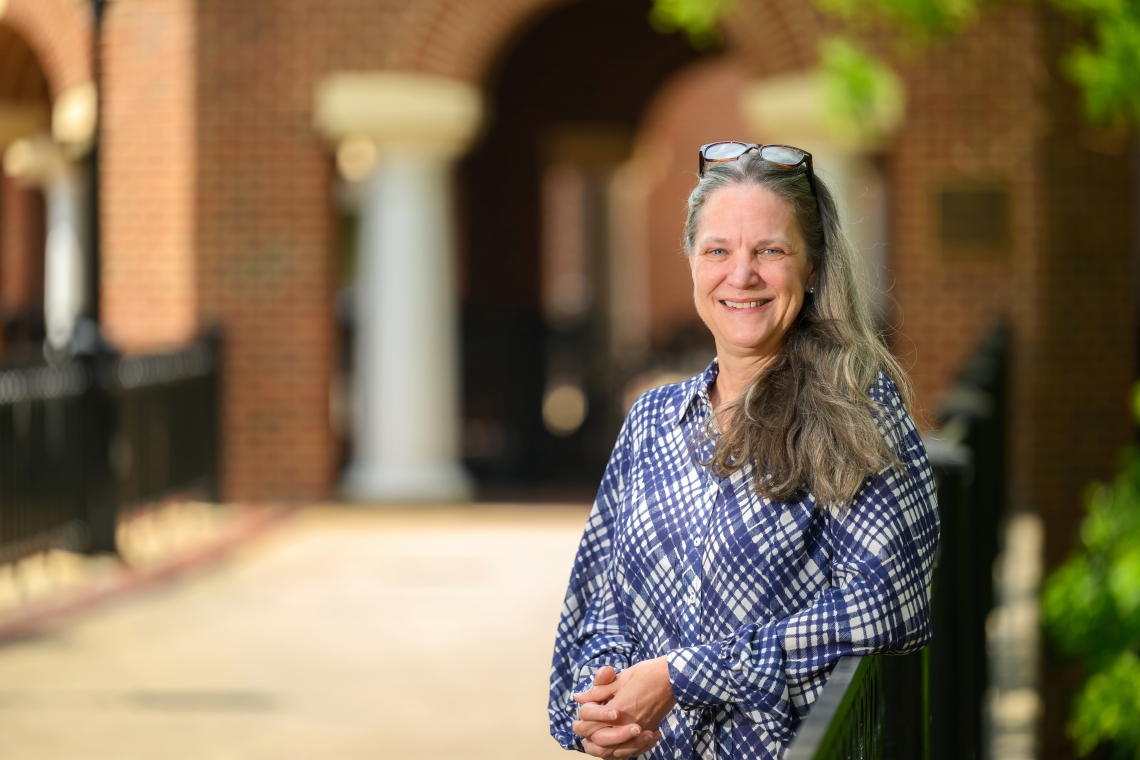
Empathy & Compassion In May, Mary Hipp ’90 said being a member of the second class of women undergraduates at W&L taught her a lot— although she didn’t realize it at the time.
“My life has not been a straight line. None of it was planned or predicted. I’ve just been along for the ride.”
~ Mary Hipp ’90
Mary Hipp ’90 didn’t picture working in the uber-competitive San Francisco food scene back when she was studying theater at W&L. But after graduation, she found she loved the city’s cultural diversity, its numerous restaurants and the variety at the food markets. An instructor at a cooking school, Hipp also worked as a chef for caterers and restaurants. She held onto her passion for food, but the work itself lost some of its shine. “I was living paycheck to paycheck,” Hipp said. “I was working nights, week- ends and holidays. I had no medical insurance.”
And so, in 2005, Hipp returned to her native Greenville, South Carolina. Her parents, Anna Kate Hipp, a philanthropic and community service leader, and William Hayne Hipp ’62, a business and civic leader and a W&L trustee emeritus, still lived there. (Hayne Hipp died in 2020.) Mary planned to stay in Greenville long enough “to figure out where I was going to live in the Southeast, which was not going to be Greenville.”
Almost two decades later, Hipp still hasn’t left. “I saw how much Greenville had grown, and then I started getting involved with the community and kind of got myself entrenched.”
Values
That community involvement led to Hipp’s co-founding of Feed & Seed Co., a nonprofit with a mission to build a sustainable local food system. She also serves as board chair. Feed and Seed’s aim is to close distribution gaps that make it hard for regional farmers to get their food into the community and, in particular, into food deserts, where it’s nearly impossible to buy fresh, nutritious produce.
“Considering how much growing we have going on here,” Hipp said of upstate South Carolina, “it’s sad there are deserts.” Such areas lack grocery stores, so people must shop at gas stations or places like Dollar Tree. “That’s all packaged, preserved foods,” she noted.
The origins of Feed & Seed date back to 2012, when Hipp was named a Liberty Fellow, joining a network of values-based leaders committed to improving opportunity for South Carolinians. Her parents founded the organization.
“When you are a Liberty Fellow, you have to come up with the project,” Hipp explained. “And my project was to improve the nutrition and flavor of schoollunches.” Her partner for that work was a former school employee who was excited about getting local produce into school lunches. That got Hipp thinking about how to connect food growers with people who need food.
Leap
In 2022, Feed & Seed took a giant leap with the opening of its Food Innovation Hub: part retail store, part classroom, part food-processing and storage facility. It’s in the Judson Mill neighborhood, Greenville County’s most food-insecure ZIP code.
The organization received a $250,000 grant from the Appala- chian Regional Com- mission to help get the hub up and running. “Their work serves as a model for ways organizations across Appalachia can address community needs while growing a vibrant local food economy,” said ARC Federal Co-Chair Gayle Manchin.
Folks from all walks of life, including those who use SNAP/EBT assistance, shop at the Feed & Seed Green Market & Café, which sells fresh produce along with foods made at the facility. It also provides produce for other local nonprofits. Additionally, farmers in the region can sell their produce through FoodShare.
Hipp has developed a better understanding of the community’s needs. Some Feed & Seed customers live in motels without kitchens; others are seniors who can no longer safely operate a stove. To accommodate them, “we’re doing research and development on freeze-dried soup mixes. And then you’ve got a healthy soup made from local produce with nothing in it that you can’t pronounce.”
Reflecting on her career, she mused, “I can’t decide if I’m stupid or stubborn. You have to be flexible and agile. More often than not, the first idea is not going to be the right idea.”
In May, she told the seniors at Baccalaureate about what she gained from W&L: “Learning how to stand up for what I believe in, politely demanding respect, and having empathy and compassion for a rapidly changing world are tools I learned here and still use in my life.”
More About Mary
- Hipp majored in theater, specializing in technical production, and learned skills she now uses regularly: leadership and creative problem-solving.
- She has fostered over 20 Great Danes.
- Her senior year, Hipp lived in the same apartment building as nine members of Sigma Alpha Epsilon. Tired of the men bumming food, she began cooking them simple meals— “nothing fancy,” like tacos and roast chicken.
